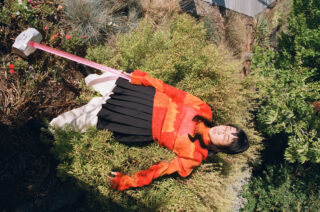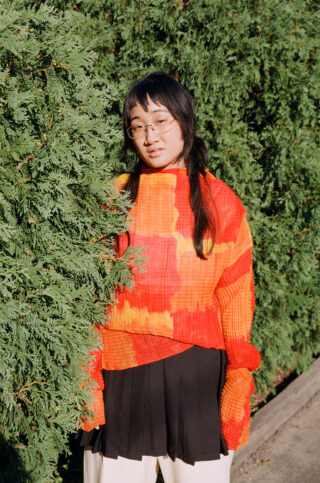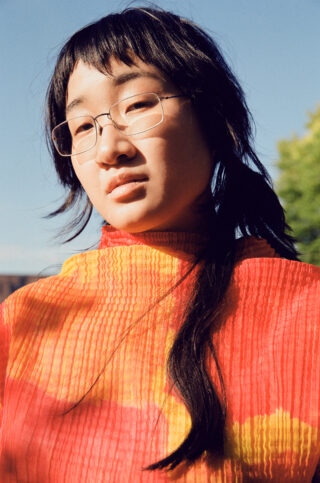Yaeji: “What would it feel like if I was carrying something violent?”
The Korean-American artist is smashing up pop conventions and starting again

The Korean-American artist is smashing up pop conventions and starting again
“Do you want to meet the hammer?”
Yaeji walks off-screen smiling. Her small fluffy dog (possibly a Bichon Frise) is napping on the arm of a sofa, and perks its head up as the hammer comes into frame. It’s massive: a sledgehammer with a cute drawing of a face on it. She holds it with two hands and sits back down, resting it on her shoulder in an embrace. “Wow, so chunky,” she says, gently patting the hammer with her hand.
It’s less than a minute into our call and it’s clear how much fun Yaeji is having wielding a large weapon. For an artist capable of writing sensitive and thoughtful songs like ‘Waking Up Down’ and ‘Done (Let’s Get It)’, this might not be the first thing you’d associate her with.
When the Korean-American electronic pop artist first gained attention with a beloved batch of club tracks over five years ago, the soft deadpan of her vocal gave a sense of ease to what were often muscular, propulsive tracks. Now, she aims to be a strong, aggressive element within music which has shifted into subtler forms. She describes the Hammer/Yaeji contrast as a kind of cosplay.
“What would it feel like if I was carrying something like a sledgehammer, or a big bat, something that’s so obviously violent and masculine to someone like me, when I find that extremely uncomfortable?” she says.
This hammer has acted as a helpful prop, prompt, weapon and muse over the making of Yaeji’s debut album, aptly named With A Hammer. The debut tag is a funny one, given she already released longform material with her meditative mixtape What We Drew 우리가 그려왔, but the distinction is an important one for her.
“I waited this long to write an album because I wanted it to be a body of work that represented a thought or an intention.” she says. “I figured I need to write a narrative or build a world before writing the music. I know myself with how I create music, and it’s often so sporadic and so messy. It’s so in the moment, which I love, but it’s almost like I have very little control over it.
“The prompt I set up for myself when I wrote the story of this hammer is that it was birthed from my anger, for lack of a better word. And the journey of me and the hammer, going through experiencing things living our day to day lives, is what it looks like when anger is passing through me for the first time in a real way.”
When you think of anger represented through song, what comes to mind? You might think of metal vocalists, or pissed-off punk aggressors. You could picture Zack de la Rocha’s expletive-filled choruses, or N.W.A.’s blunt-force lyricism. No matter what, the anger is probably loud and obvious. In contrast, the anger embodied on With A Hammer is subtle and internal. It’s more true to daily life because of it. Sonically, the album uses a warm and inviting approach, with slick melodies and spritely and delicate percussion soothing the knotted emotional subject matter.
“My whole life, I was thinking ‘I never get angry’,” says Yaeji, “or at least the anger that’s more visible or surface level, which is usually like a violent or physical expression, a masculine expression of it. That didn’t feel like me.”
Like it did for many of us, the forced downtime of lockdown gave her a chance to reflect on the way the world worked beforehand, and how she existed within it.
“A lot of the lockdown was me being forced to sit with all these experiences and emotions that were queued up. Because in my busy normal life I didn’t allow myself to process, and I would always look for distractions.”
First up in the queue was that feeling of anger. A cousin had told Yaeji about the ‘rage rooms’ that had caught on in South Korea – a service where you can pay to break objects in a room without any consequences. She tried it out in Brooklyn, curious at what she could get out of it.
“I think by the time she told me they had become illegal in Korea. But it was an interesting prompt to me because I feel like Korea is a very suppressed culture. You can feel it, even in how the language is constructed. There’s a lot of dancing around emotions, reading in between the lines and thinking more as a group rather than an individual, which innately involves suppressing some of your personal desires, reflections and emotions.
“Rage rooms came up in a culture like this, where you pay a set amount of money for time and specific objects you can break. Then, you’re carefully given all this safety equipment and a bat. There’s multiple cameras in the room and a timer. To me, that felt so controlled in a way that’s still suffocating.”
In the past Yaeji has admitted to intentionally mixing lyrics in Korean and English as a way of obscuring meaning. The new record instead shoots for honesty and openness through a narrative approach. These are songs about using anger as a method for self improvement or a tool to break down oppressive structures. Fiction has always had this power to connect, for her. She has to be careful about what she consumes, because it all feels so real to her. Still, that kind of approach can also act as a kind of safety barrier between you and the listener. When writing about such vulnerable topics, as an artist with an ever-increasing public presence, that can be necessary.
“The narrative definitely helps build a little bit of distance and helps at least me compartmentalise it into a performance,” she says. “But inevitably, even though I had this fictional story, when it came to writing lyrics for the songs, it didn’t feel natural or right to make the lyrics be a continuation of the narrative. It had to come from a real place.”
Yaeji is wonderfully open and forthcoming given she’s speaking to a total stranger. We speak about the oddness of oversharing in these kinds of interviews, and she admits that the distance of a Zoom chat helps her settle into this sharing role.
“It’s actually been a bit tricky, because it’s the first time I put my face up on the album art,” she says. “I have so many photos and I’m doing all these music videos where I’m acting. There’s a layer of separation in performance, but it still demands of me. Even in these interviews, it gets really deep and insightful, but I realise afterwards, ‘Wow, it had to be me’. I have to share about myself and go deep about my personal internal world. I’m pretty introverted. So sometimes it takes a second to process what just happened.”
We do eventually get deep. For one, what specifically is she angry at? There’s the constant pressure of oppressive societal structures put on everyday people, stripping away their freedoms in subtle ways. The low-level hum of anger she writes about is reflected here. That’s backed up by the album’s allusions to dreaming, as well as its use of silence and space, inspired by the American historian Robin D.G. Kelley’s idea of ‘freedom dreams’ as a framework for thinking through and around injustice.
“Resting is also resistance. Resting is also revolution,” she says. “Whatever you do with your day-to-day, that’s not on the surface seemingly political, is actually an act of revolution and resistance.
“The song ‘With a Hammer’, the lyrics sing about how he takes away the time and space for our freedom dreaming, which is abstract on purpose for you to interpret. The overarching idea is that he is the oppressor, that he is white supremacy, that he is society – all of these things that take away our time to rest, to heal and to dream.”
Part of this exploration stemmed from a course called Rhythm Race Revolution, which Yaeji took during lockdown. It combined music and readings mostly from the perspective of Black musicians and other marginalised groups to show how these ideas can be explored sonically. Within it, she circled a note from her teacher: ‘Music is like alchemy’.
“That was the catalyst for this entire world with the hammer. Maybe a lot of things are actually like alchemy, and maybe we, who interact with music, art, emotions, and relationships, we’re actually just alchemists. Something like anger or joy can transmute into something completely different.
“In this story, my anger has turned into a physical form of a hammer that will – spoiler alert – at the end, transmute into something else that’s no longer a physical form. That’s really the magic of this fictional story, but also the magic that exists in real life, like in music when you and I interact with music as a listener and as a creator, there’s magic in it.”
The way Yaeji plays with genre and sound carries forward this alchemy idea too. Though she first gained attention as a more clear-cut house musician, with secret-weapon DJ tracks like ‘Raingurl’ and ‘Drink I’m Sippin’ On’, her music has morphed into something more singular and free. Many of the songs here blur the lines between pop song, dance track and diary entry. That freeness is something she’s experienced personally too.
“On What We Drew 우리가 그려왔, I started to see an inkling of how freeing music can can be. With this album, I’ve really experienced how liberating music is. It’s things that I don’t have words to describe. I keep a journal, which is a really good practice for me, because I grew up being used to censoring my thoughts and my feelings. In the journal I’m trying to pretend that no one’s ever going read it and just, like, no filter, right? [But] even that isn’t enough. On With A Hammer, some of those feelings and thoughts can actually be expressed sonically.”


Like all solo records, this album has been a personal venture, but it’s also one she’s been able to share with a close-knit group of friends and collaborators, who she’s been able to lean on for support. That’s true of its opening moments on ‘Submerge FM’, which begins with a gorgeous flute and synth passage built on a sample played by her friend Gabrielle Garo. The moment came from an improvised jam that happened when Yaeji reached out to her friends for inspiration.
“I gathered a bunch of session musician friends that are local to Brooklyn to a recording studio that’s run by a friend of a friend. It’s really cosy and vibey. The studio kind of feels like a cabin, and it has a backyard. It was very casual. I wanted to work with session musicians as I’d never tried that before. A lot of what I was listening to when writing this also was surprisingly not too dance music heavy, and not even fully electronic at times. I was curious, if I’m given samples of other instruments, what would come up?
“Instead of going to the internet and finding free sample packs, I wanted it to come from a meaningful place of people I actually know and care about…Whenever I was stuck with writing the demos, I just looked in that folder, and one day I pulled up Gabby’s sample of the flute. She was improvising on top of an old demo that I didn’t mean to use for anything.”
Yaeji often works with those she’s already close to out of a need for genuine communication and trust going in. The record is no different. Take Loraine James, who she met on a trip to London while going to see mutual friend Object Blue DJing. James reconnected with Yaeji on a visit to New York soon after. “We would kick it there,” she says. “Friendship through music and seeing a friend in a different context always makes you feel a deeper level of connection,” she says. This made James a natural collaborator on ‘1 Thing To Smash’, where her smudged vocal contributions and tactile synth work match the mood perfectly.
“I asked her to do anything that you see fit, which is my preferred way of collaborating, because it takes a lot to decide if I want to let this person into this world,” she says. “It is such a personal process and creation. That’s why I usually work with close friends. But once they’re in, I want them to do anything they see as true to them. So that’s what we did.”
That feeling transfers over to the record’s other collaborations, such as K Wata, a member of her Slink NYC crew, or Enayet who she has worked with since the ‘Raingurl’ days and describes as an extension of herself. With the latter, she made ‘Michin’, the record’s most outwardly aggressive offering, and a true test of what she could achieve in that role.
“‘Michin’ was the last track to be written, and I made that because the overall feedback I was getting from close friends when I played them the demo and explained to them that it’s about anger passing through me, was that the album sounds sonically very chill, for lack of a better word. They didn’t mean it in a bad way, but it’s not obvious anger. While I really liked that and it taught me some things about me, It made me question what would happen when I fully went for it.”
For every ‘Michin’, there’s a track like ‘Done (Let’s Get It)’, a heartwarming track whose video features Yaeji and her grandfather dancing through the streets in bunny costumes while she sings of breaking generational cycles. Even more affirming is ‘Pass Me By’, where Yaeji sings to an unnamed ‘she’.
“I left it more vague so it could shapeshift depending on who was listening at the time, but for me…” she says, politely shooting down a bad theory of what it could be about, “for me, at the time it was me recognising for the first time that the younger me has been with me this whole time. She’s been looking at me, but it’s taken this long to recognise her and look back at her into her eyes and acknowledge her.
“The ‘she’ when I was writing was younger me, and being grateful that she hasn’t changed, and that she has been so patient with me. It’s this beautiful relationship when you treat yourself as you would another person. That’s been such a powerful tool for me for healing and overcoming a lot of fears. Loving myself as much as I would a friend or family member, which comes so naturally to me. It’s so easy for me to express and give, but it’s been so hard to do that with myself. Calling her ‘she’ has done so many things for me.”
Anger is just one element of many on Yaeji’s new record. Of course we want to see her smash shit with a hammer, but for every hint of frustration there’s a song about gratitude or self-love, and how that love links to a bigger picture. It’s also the kind of record that feels like a living entity, with just enough ambiguity to read differently depending on your own mood. It seems it’s that way for Yaeji too.
“That ‘she’ could shapeshift to be anyone else in my life, at the same time. We’re mirrors of each other”, she says, smiling just as widely as the face on her hammer.
Photography by Dasom Han